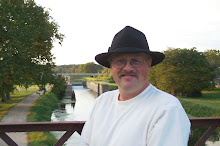Lets cover the first thing we all hear, first time we try to write something: Write what you know.
Now, this is good information, and a good start for your junior high composition project. It works well. It gets you familiar with putting your thoughts together in a way that isn't daunting. the problem is, what do we do when we want to get beyond what we know? If we're honest, most of us lead pretty boring lives. What to do then? At that point, you start doing research.
When I went to WIU, I was a History Education Major, a Biology Education minor, and I wrote for the school paper. I learned how to do research. There are huge quantities of legitmate material and facts out there. Millions of sources on the internet alone. You don't have to become an expert in a give field, just enough to fill in details of your charectors lives, or the plot of the book. If you want to do a story about dog grooming in outer space, first you need to know about how the pro groomers do it. There are probably a number of them in your town. Talk to them first hand on a day they're slow. First thing is to explain why you need the info, and pick their brains about it. You may even be able to find out thier thoughts of grooming in space. Would zero gravety affect the dog? Where would the loose hair go? They probably have never thought of it before, but you'd probably get some gems for your story.
A second hand example. A friend of mine knew the county coroner of a small downstate county. he was writing a pretty vicious crime story, and needed to know the affects of a washing machine on a severed head. He was able to procure such an item, and with the coroner's supervision, ran the head through a wash cycled on an industrial washer. The results weren't pretty, but it gave the story an authentcity it wouldn't have had any other way.
Do you need to stuff a head in a washing machine? Probably not, but there are experts in your area that often would love to talk about their jobs. Police have great insights not only into their world, but criminal minds as well. One of the girls I dated in high school had a narc cop for a father. He had some great stories, and in hindsight, I wished I'd written some down.
One important thing to remember, don't just show up unannounced. Call and make an appointment to talk to someone. Explain what you're looking for, and have questions ready ahead of time. I back up my notebook with a small recorder. It's an old reporter's habit, but a good one to get into.
If you don't have a lot of access to the internet, or need something unusual there isn't a lot of data on, you can still do research with hard copies. Go to the library, and go through the books. County courthouses are great for facts of births, deaths, marriages and property. In Illinois, Platt books are on record in courthouses. It shows property ownership in a give year, and the layout of the property. It also if accompained by a picture of the home. I'm talking 1800's here, early 1900's. If you want to know what an old Victorian house looked like in its glory days, that's a great way to find out.
The whole point of this? Do your research. Not many of us live exciting lives filled with adventure. Barry Eisler was a CIA spook. His experiance give his books great nuance. Trey Barker is a county deputy. His work has a lot of detail you don't find elsewere. We can't all live lives like that, but we can talk to other people who do, or find the stories they've left behind.
Good writing.
Monday, April 6, 2009
Subscribe to:
Post Comments (Atom)

No comments:
Post a Comment